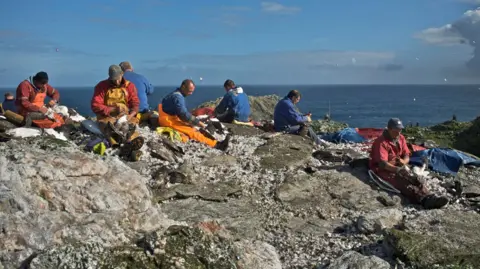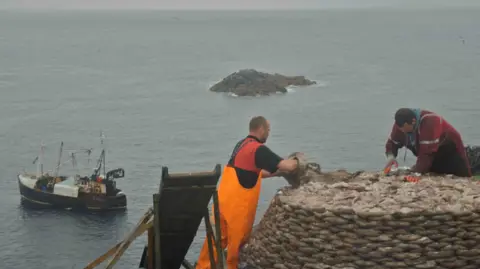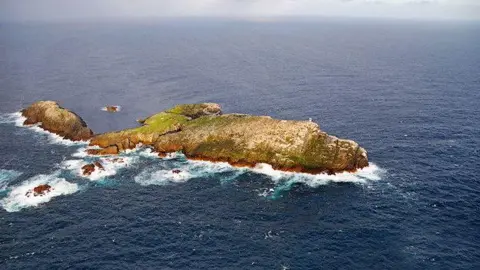Guga hunt tradition returns after licence granted
 BBC
BBCA licence for Scotland's last surviving hunt of young seabirds has been granted for the first time since 2021.
For centuries, thousands of gannets were killed for their meat during an annual hunt on Sula Sgeir, a small rocky island 40 miles (64km) north of Ness on the Isle of Lewis.
The tradition, called a guga hunt, dates back to the 15th Century but has not been held for the last three years due to concerns around avian flu.
Scotland's nature agency, NatureScot, said it had received an application for a hunt this year and had granted a licence with a limit of 500 birds.
The agency said the number has been reduced from the 2,000 kills permitted in recent times in order for the gannet population to recover.
Animal welfare campaign group OneKind has described the hunt as "cruel".

Sula Sgeir is an uninhabited island which is home a number of seabird species, including about 11,000 gannets.
The hunt is held in August and traditionally lasts about two weeks.
The 10-man team of hunters, known as the Men of Ness, lands on the island, then kills the young gannets after catching them on the cliffs using a pole and noose.
They stay on the island during the hunt, sleeping in rudimentary stone huts.
The birds are gutted, plucked and salted before the team brings their harvest back to Ness, the northernmost part of Lewis.
What do guga taste like?
Once an essential part of the winter diet in Ness, traditionally served with potatoes and milk, guga are now regarded as a delicacy - although they may not be to everyone's taste.
The meat has been described as tasting like a cross between kipper and steak or "salty goose".
Other descriptions have included it being "somewhere between rotten leather and fishy beef".
 Stephen Branley/Geograph
Stephen Branley/GeographIn the past, guga hunts were carried out in other parts of Scotland, including on the remote archipelago of St Kilda.
In modern times they have proved controversial, with animal rights campaigners condemning the method of catching and killing the birds as "barbaric".
Defenders of the tradition say it is part of island heritage and if carried out correctly is no more cruel than other activities such as grouse shooting.
In 2014, an online petition opposing the hunts was organised by North America-based campaigns organisation Care2 and attracted thousands of signatures.
NatureScot's predecessor, Scottish Natural Heritage, said in 2016 the hunts were "sustainable", and they are permitted under the Wildlife and Countryside Act.
Avian flu
In 2022, Avian flu hit seabird colonies in the Western Isles and the remote St Kilda archipelago, with gannets among the species worst affected.
This meant that, for only the second time since the end of World War Two, the guga hunt did not go ahead.
The previous occasion was in 2020 due to the Covid pandemic.
NatureScot said it recognised the cultural significance of the hunt.
A spokesperson said: "This is the first year we have received a licence application from the Men of Ness since 2021, due to concerns about the impact of avian flu on the gannet population.
"We have thoroughly assessed the application taking into account survey data and population analysis and we have granted a licence with a limit of 500 birds.
"This revised limit for 2025 safeguards the sustainability of the Sula Sgeir gannet population and allows for its continued recovery following avian flu."
OneKind chief executive Jason Rose said Nature Scot had made a "poor decision".
He said: "There is simply no need for this cruel activity to take place.
"We live in a modern society where we have many more choices about where our food comes from.
"The guga hunt is a grisly story from history that should be left in books or a museum."
